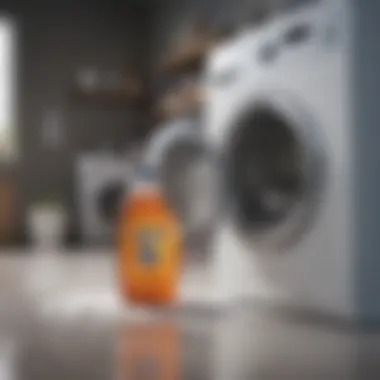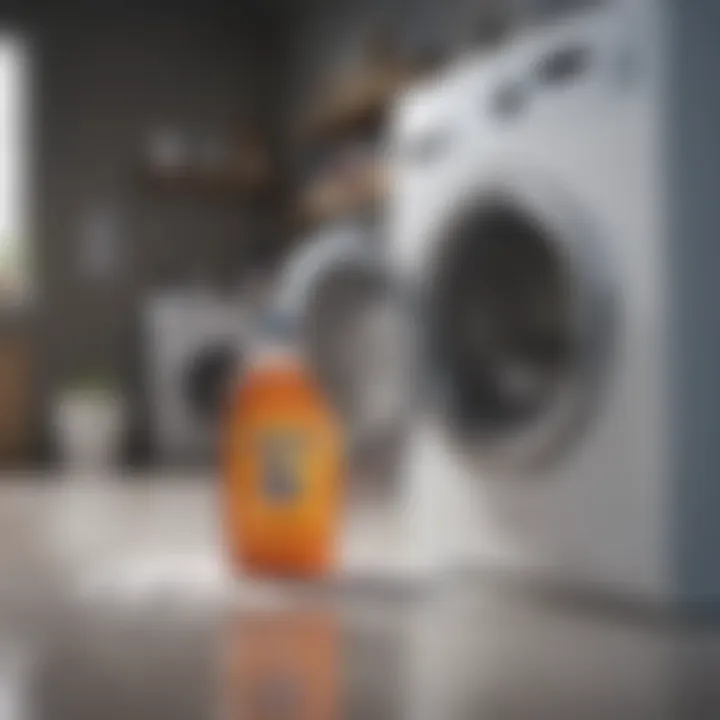Cleaning Your Washing Machine with Vinegar and Baking Soda


Intro
Maintaining a washing machine goes beyond simple use; it requires regular cleaning to avoid odors and buildup. Vinegar and baking soda stand out as effective, affordable cleaning agents often found in many households. This article will explore their effectiveness in cleaning washing machines, outlining methods, benefits, and insights for optimal usage. By understanding how to incorporate these materials, readers can enhance the lifespan and efficiency of their machines.
The Benefits of Using Vinegar and Baking Soda
Vinegar and baking soda each bring unique advantages to the cleaning process.
Vinegar:
- Acts as a natural disinfectant, eliminating bacteria and mold.
- Removes stubborn stains and odor caused by mildew.
- Softens fabrics, enhancing washing efficiency.
Baking Soda:
- Functions as a gentle abrasive that helps scrub away grime.
- Neutralizes odors, leaving a fresh scent.
- Balances acidity, enhancing the cleaning power of vinegar when combined.
When used together, vinegar and baking soda not only cleanse but also maintain the internal components of your washing machine, thereby prolonging its lifespan.
How to Clean Your Washing Machine
The cleaning process using these two ingredients is quite simple yet highly effective. Here’s a step-by-step guide:
- Prepare the Machine:
- Add Vinegar:
- Run a Cycle:
- Pause the Cycle:
- Add Baking Soda:
- Resume Cycle:
- Wipe the Drum:
- Ensure the machine is empty. Look for any visible residues or debris.
- Pour two cups of white vinegar into the machine’s drum. This will help in killing any bacteria and breaking down residues.
- Initiate a hot water cycle. This step helps in cleaning internal parts of the machine thoroughly.
- About halfway through, pause the machine. Let the vinegar sit for at least 30 minutes. This dwell time enhances its disinfecting properties.
- After the 30 minutes, add one cup of baking soda directly into the drum.
- Resume the hot cycle for complete cleaning. The interaction between vinegar and baking soda will produce effervescence, aiding in the loosening of grime.
- Once the cycle completes, use a clean cloth to wipe the interior of the drum and the rubber seals.
"Regular use of vinegar and baking soda can significantly improve washing machine performance."
Potential Drawbacks
While vinegar and baking soda are generally safe, they might not suit every washing machine brand or model. Always consult the manufacturer's guide before applying any DIY cleaning methods. Prolonged or excessive use of these substances can cause wear on certain rubber components, such as seals and hoses.
Utilizing these backyard staples for the cleaning of washing machines becomes not just an economical alternative, but an environmentally friendly option as well. With the right methods, vinegar and baking soda can transform the routine maintenance of your appliance, ensuring it remains in optimal condition for years to come.
Prelims
In the realm of household management, washing machine maintenance is often overlooked. Yet, a clean washing machine plays a pivotal role in ensuring the effectiveness of laundry as well as the longevity of the appliance itself. As a common household chore, most people do not think of cleaning their machines until a problem arises. This article delves into the effectiveness of vinegar and baking soda as cleaning agents for washing machines, specifically examining their benefits, limitations, and practical applications.
Vinegar and baking soda are not just versatile kitchen staples; they hold significant potential for cleaning. Both of these ingredients possess properties that can tackle grime, odors, and residue build-up commonly found inside washing machines.
Key Points to Consider:
- Environmental Safety: Using vinegar and baking soda reduces reliance on harsh chemicals, presenting a safer option for both the user and the environment.
- Cost-Effective Solutions: These common household items are inexpensive compared to commercial cleaning products, making them appealing for regular maintenance.
- Ease of Use: The application of vinegar and baking soda in cleaning routines is straightforward, requiring little time and effort.
- Prevention of Build-Up: Regular use can prevent the growth of mold and mildew, issues known for causing unpleasant odors.
In summary, this discussion emphasizes the importance of maintaining a clean washing machine through simple, effective means. By exploring the properties of vinegar and baking soda, readers can gain insights on how to effectively incorporate these agents into their cleaning habits, ultimately enhancing both machine efficiency and lifespan.
"Regular maintenance of your washing machine is crucial to optimal performance and longevity."
By the time you reach the conclusion of this article, you'll have a comprehensive understanding of how vinegar and baking soda can be utilized effectively in your routine cleaning processes.
Understanding Washing Machine Maintenance
Washing machines are essential household appliances, responsible for cleaning clothes regularly. However, they also require proper care to ensure they function efficiently. Understanding washing machine maintenance is not just about repairing issues when they arise. It includes proactive measures to prevent breakdowns and to keep the machine operating at its best.
Importance of Regular Cleaning
Regular cleaning of your washing machine can lead to several benefits. First, it helps to remove residue from detergents and fabric softeners that can accumulate over time. This buildup can create a less-than-pleasant odor and can affect the cleaning performance of the machine. A clean washing machine ensures that your clothes are being washed in a hygienic environment.
Moreover, regular maintenance can extend the lifespan of your appliance. Machines that are not cleaned periodically may encounter more wear and tear due to trapped dirt and grime. This can lead to potential breakdowns and repairs, which can be costly.


It is essential to adopt a routine cleaning schedule. Monthly cleanings with natural solutions, like vinegar and baking soda, can be effective. Not only are these cleaning agents inexpensive, but they also mitigate the risks associated with harsh chemicals.
Common Issues with Dirty Washing Machines
A washing machine that has not been properly maintained can face several issues. One common problem is the development of mold and mildew, especially in front-loading machines. These machines can be notorious for retaining moisture, leading to an unpleasant smell. This mold can spread to your clothes, making them smell musty.
Additionally, dirty washing machines can cause clogs in the drain. Residue buildup within the system can lead to slow drainage. This can cause water to pool in the drum or even leak out, leading to potential damage to the flooring and surrounding areas.
To summarize, neglecting washing machine maintenance can result in:
- Bad odors from mold and mildew
- Reduced cleaning efficiency
- Clogs and drainage issues
- Increased likelihood of repairs and replacements
Regular maintenance, including cleaning and inspection, can alleviate these problems and maintain the performance of your appliance.
Vinegar as a Cleaning Agent
Vinegar serves as a potent cleaning agent, especially when it comes to maintaining the interior of washing machines. This common household item is not just a kitchen staple but also a multifaceted tool for cleaning. The acids found in vinegar provide effective cleaning capabilities without the use of harsh chemicals, making it safer for both users and the environment. This section will highlight the chemical properties that contribute to vinegar's effectiveness, outline how it specifically cleans washing machines, and discuss the distinct advantages of incorporating vinegar into your cleaning routine.
Chemical Properties of Vinegar
Vinegar primarily consists of acetic acid, which typically ranges from 4% to 8% concentration in household varieties. This acidity is key for its cleaning efficacy. The following points highlight its relevant chemical properties:
- Acidity: The acidic nature allows it to break down mineral deposits and soap scum effectively.
- Natural Antimicrobial: Vinegar has antibacterial properties, which help in reducing bacteria and mold in damp environments like washing machines.
Moreover, vinegar serves as a solvent, meaning it can dissolve certain solid substances, enhancing its cleaning capabilities.
How Vinegar Cleans Washing Machines
The cleaning mechanism of vinegar occurs through a few key interactions:
- Breaking Down Deposits: Vinegar effectively dissolves mineral buildups that can form from water hardness. This includes calcium and lime deposits, which can accumulate over time.
- Neutralizing Odors: The natural formulated properties of vinegar help to neutralize foul odors that result from stagnant water and mildew. This is particularly beneficial for machines that frequently wash heavily soiled items.
- Cleaning Dispensers and Filters: By running a washing machine cycle with vinegar, it can help clean the dispensers and filters where detergent residue often builds up. This keeps the machine functioning optimally.
Advantages of Using Vinegar
Using vinegar as a cleaning agent for washing machines offers numerous benefits:
- Environmentally Friendly: Unlike many commercial cleaners, vinegar is biodegradable and poses minimal environmental risks.
- Cost-Effective: Vinegar is affordable and readily available, providing an economical solution for cleaning needs.
- No Residue: It leaves no harmful chemical residues behind, ensuring that clothes remain safe during subsequent washes.
- Versatility: In addition to washing machines, vinegar can be used in other areas of the home, making it a useful cleaning agent for multiple surfaces.
"Vinegar is a versatile and eco-friendly solution for washing machine maintenance, aiding both the machine's longevity and efficiency."
Baking Soda in Washing Machine Care
Baking soda serves as a crucial compound in washing machine maintenance. Its unique properties make it a versatile cleaning agent that can address various issues found in washing machines. The inclusion of baking soda in cleaning routines not only promotes a cleaner appliance but also enhances the overall efficiency of the washing machine. This section will dive into the properties of baking soda, its specific role in cleaning washing machines, and the notable benefits that come with its use.
Properties of Baking Soda
Baking soda, chemically known as sodium bicarbonate, possesses natural alkaline properties. This characteristic makes it effective in neutralizing odors and breaking down grime, stains, and other residues that may accumulate in washing machines over time. It also acts as a gentle abrasive, aiding in the removal of dirt without scratching sensitive surfaces inside the machine. Its non-toxic nature adds to its appeal, making it a safer option compared to harsher chemical cleaners. Additionally, baking soda is cost-effective, readily available in households, and environmentally friendly.
Baking Soda's Role in Cleaning
In the context of washing machine care, baking soda has several functions. First, it helps to deodorize. Clothes can sometimes retain unpleasant odors due to residues from detergents or fabric softeners. By adding baking soda into the wash cycle, it helps to neutralize these smells effectively. Next, baking soda assists in removing stubborn stains. When combined with water, it creates a solution that penetrates tough stains. Moreover, it can enhance the performance of detergents by softening the water, allowing for more effective cleaning.
Benefits of Incorporating Baking Soda
Incorporating baking soda in cleaning routines offers numerous advantages:
- Odor Elimination: It combats unpleasant smells, leaving your washing machine and clothes smelling fresh.
- Stain Removal: Its natural abrasiveness enhances the cleaning power against tough stains.
- Water Softener: This makes detergents more effective by reducing mineral buildup, which can lead to a more thorough cleaning.
- Cost-Effective: Unlike many commercial cleaning solutions, it is inexpensive and widely available.
- Environmentally Friendly: Being a natural substance, it has minimal negative environmental impact.
In summary, baking soda provides an array of benefits that significantly contribute to washing machine maintenance. Its properties, roles, and advantages make it an essential component for anyone looking to keep their washing machine performing optimally.
Combining Vinegar and Baking Soda
Combining vinegar and baking soda can create a powerful cleaning solution for washing machines. This section explores how these two common household items work together effectively, providing insights into their chemical interactions and best practices for use. Their combination not only enhances cleaning but can also extend the lifespan of washing machines.
Chemical Interaction and Effects
When vinegar and baking soda combine, they undergo a chemical reaction that produces carbon dioxide and water. This reaction occurs when the acetic acid in vinegar reacts with sodium bicarbonate in baking soda. The effervescence created by this reaction can help to dislodge dirt, grime, and mineral buildup inside the washing machine.
During this interaction, the fizz can reach into crevices and nooks that a typical cleaning process might miss. The release of carbon dioxide gas generates bubbles, allowing for a thorough cleaning mechanism. This ensures that residues from detergents, fabric softeners, and minerals from hard water are effectively loosened and removed, ultimately improving the efficiency of the machine.
Key Effects:


- Dirt Removal: The bubbling action helps lift debris.
- Odor Neutralization: The reaction can neutralize bad smells that accumulate over time.
- Preventing Mold Growth: This cleaning combination can help mitigate mold accumulation in damp environments.
However, it is important to note that while this reaction is beneficial for cleaning, it should be used thoughtfully. Overuse or mixing inappropriately can potentially affect some machine components, so moderation and understanding your machine’s compatibility are crucial.
Best Practices for Effective Use
To maximize the benefits of your cleaning routine with vinegar and baking soda, consider the following best practices:
- Measure the Ingredients: Generally, a half cup of vinegar and a quarter cup of baking soda work well together. Accurate measurement ensures a well-balanced reaction.
- Timing is Key: Perform the cleaning process during the machine's empty cycle or when no laundry is loaded. This helps the mixture circulate throughout the drum effectively.
- Allow Time for Reaction: After adding the baking soda, give it a few moments to react with the vinegar before running the cleaning cycle. This allows for a more potent reaction.
- Follow Up with Hot Water: Running a hot water cycle after the initial reaction can help dissolve any remaining residues and aid in rinsing out the machine.
- Routine Schedule: Incorporate this cleaning method at least once a month to maintain a fresh and efficient washing machine. Regular use will keep problems like limescale buildup or unpleasant odors at bay.
By following these practices, the combination of vinegar and baking soda can become a vital part of your washing machine maintenance routine, ensuring it operates efficiently and remains in good condition for a longer time.
Step-by-Step Cleaning Process
Cleaning your washing machine may seem simple, but following a structured step-by-step process is crucial. This ensures thoroughness and maximizes the effectiveness of vinegar and baking soda as cleaning agents. A systematic approach can also save you time and prevent potential damage to the machine.
Gathering Necessary Materials
Before diving into the cleaning process, it is essential to gather all required materials. Here’s a concise list of what you will need:
- White vinegar
- Baking soda
- Measuring cups
- Clean cloth or sponge
- Toothbrush for scrubbing
- A bucket or bowl
Each item plays a significant role in the cleaning process. White vinegar acts as a natural disinfectant while baking soda serves as a mild abrasive, effective against stubborn residues. Having these materials on hand before starting ensures a smooth workflow without interruptions.
Preparing the Washing Machine
Preparation is a key element of the cleaning process. Begin by emptying the washing machine. This is important because any remaining clothes or items can interfere with the cleaning agents. Next, assess the area around the drum and compartment for detergent. Clear out any visible buildup from previous loads, as this can also hinder the cleaning process.
Once emptied, run a short hot water cycle without detergent. This will help to soften and loosen any grime inside the drum. Adding a cup of white vinegar during this cycle amplifies the effect, creating a cleaner environment for the next steps.
Executing the Cleaning Routine
With materials gathered and the machine prepped, you can now execute the cleaning routine:
- Pour Vinegar: Start by pouring two cups of white vinegar into the detergent dispenser. This step is essential in tackling mold, mildew, and odors.
- Add Baking Soda: Once vinegar is in, carefully add half a cup of baking soda directly into the drum. The combination of these two agents will work effectively against buildup during the wash cycle.
- Run a Hot Cycle: Set the washing machine on the hottest setting and start a complete wash cycle. This allows the vinegar and baking soda to mix thoroughly and penetrate all surfaces inside the machine.
- Wipe Down Surfaces: After the cycle ends, use a sponge or cloth soaked in a vinegar solution to wipe down the interior surfaces, doors, and rubber seals. This ensures any remaining residue is removed and surfaces are disinfected.
- Final Rinse: Finally, run a second rinse cycle with cold water. This step will eliminate any leftover baking soda and vinegar, making sure your machine is clean and fresh.
By following these steps effectively, not only do you clean your washing machine inside out, but you also prevent potential future problems. Regular maintenance with this method can ensure optimal performance of your appliance.
Frequency of Cleaning
Cleaning your washing machine is not just an optional chore; it is essential for the optimal performance of the appliance. Regular cleaning helps to prevent buildup from detergent residues, dirt, and other materials that can accumulate over time. Vinegar and baking soda are effective in keeping the machine clean and functioning well. Establishing a frequency for this maintenance is critical for preserving efficiency and avoiding unnecessary repairs.
General Guidelines
The frequency with which you should clean your washing machine can vary based on a few factors. Here are some general guidelines:
- Monthly Cleaning: For households with heavy usage or more than one person, a monthly regimen is advisable. This helps minimize odors and residues.
- Every Two to Three Months: For average use, consider cleaning every two to three months. This is beneficial in maintaining the machine's cleanliness without being overly burdensome.
- Frequency Adjustments: If you notice odors or see visible residues, increase the cleaning frequency. External factors such as water quality can also affect how often cleaning is necessary.
Signs That Cleaning is Necessary
Knowing the indicators that signal a need for cleaning can help maintain your washing machine effectively. Here are some common signs:
- Unpleasant Odors: If the washer emits a musty or sour smell, it is likely due to mold or mildew buildup. This requires immediate cleaning.
- Residue Build-Up: Look for soap scum or film on the drum and agitator. Accumulation suggests that you may need to implement a cleaning routine.
- Inefficient Wash Cycles: If clothes do not come out clean and fresh as they used to, this could indicate that the machine's components are becoming clogged or dirty, necessitating cleaning.
- Visible Mold or Mildew: Inspect for visible growth around the rubber seal or gaskets. This points to moisture retention, which is a condition favorable to mold development.
Regular cleaning can profoundly extend the lifespan of your washing machine, improving both performance and performance while reducing wear and tear.
By adhering to these cleaning frequencies and recognizing the signs that cleaning is necessary, you can ensure your washing machine operates efficiently. Vinegar and baking soda play an integral role in effectively managing all these potential issues.
Impact on Washing Machine Performance
The performance of washing machines can significantly influence their efficiency and longevity. Regular cleaning, especially utilizing substances like vinegar and baking soda, plays a critical role in optimizing the performance of a machine. This discussion centers around two major areas impacted by this cleaning routine: the improved efficiency of the washing machine and its prolonged lifespan.
Improved Efficiency
When a washing machine is free of residue and buildup, it operates more smoothly. Vinegar and baking soda can effectively dissolve mineral deposits and soap scum that often accumulate in various parts of the machine. For instance, the heating element, if covered in limescale, will require more energy to heat water, thus leading to higher electricity bills. By employing these household agents, users can expect:
- Reduced energy costs: A clean machine works less hard, which means less energy is used during each cycle.
- Effective water drainage: Vinegar breaks down any clogging material; this allows for better drainage and ensures that water doesn't linger in the drum or hoses.
- Enhanced cleaning performance: Loads of laundry are cleaned more thoroughly when the machine is not compromised by dirt and buildup.
These factors contribute to an overall more efficient washing process, ultimately making laundry day less cumbersome.
Prolonged Lifespan


Maintenance of washing machines can lead to extended lifespan, reducing the need for costly replacements. Routine cleaning with vinegar and baking soda helps prevent wear and tear that occurs from operational stress caused by debris. Consider the benefits:
- Corrosion prevention: The acidic properties of vinegar help neutralize bases found in detergent residues, which can lead to corrosion over time.
- Component health: Regular cleaning extends the life of vital components like pumps and hoses, preventing clogging and breakdowns.
- Fewer repairs: By keeping the machine clean and clear of blockages, the likelihood of malfunction decreases, leading to reduced repair costs.
Potential Risks and Considerations
Understanding the potential risks and considerations when using vinegar and baking soda for washing machine cleaning is vital. These household items are commonly believed to be safe and effective. However, misuse or misunderstanding their properties can lead to complications. This section sheds light on these risks. It also examines how proper knowledge can prevent issues during the cleaning process.
Possible Damage to Components
Vinegar is acetic acid. While it has cleaning properties, its acidic nature can potentially harm some washing machine components. For instance, it can wear down rubber seals over time. Damage might not be immediate, but frequent exposure can create leaks. Another component at risk is the electronic system of the washing machine. If vinegar seeps into these areas, it could lead to malfunctions.
Baking soda, while often considered less risky, is not entirely without concerns. It can create a paste-like residue if too much is used, leading to clogs in hoses or filters. This can result in drainage issues, which are costly to fix. The key is to use these cleaning agents in moderation and ensure thorough rinsing after cleaning to prevent buildup.
Always check the manufacturer's guidelines for your washing machine before applying acids or any cleaning agents.
Understanding Machine Compatibility
Not all washing machines are designed with the same materials and components. Some may not react well to vinegar or baking soda. It is essential to verify the compatibility of your model. For instance, high-efficiency (HE) machines may contain specific seals or designs that vinegar could corrode more quickly than in traditional models.
If you have a newer model, consult the user manual or the manufacturer’s website for recommendations. Ideally, consider reaching out to customer service to clarify any doubts.
In summary, while vinegar and baking soda can be effective cleaning agents, be cautious. Understand their interactions with your machine's components and take necessary precautions to avoid damage.
Alternatives to Vinegar and Baking Soda
While vinegar and baking soda are often heralded as the go-to options for washing machine cleaning, exploring alternatives can provide valuable insights. Different cleaning methods may offer unique benefits for those facing specific cleaning challenges. Therefore, examining alternatives allows users to tailor their cleaning approaches to fit their individual needs and preferences.
Commercial Cleaning Products
Commercial cleaning products offer a different route for washing machine care. These products are specially formulated to tackle stubborn stains and odors that may not yield to vinegar or baking soda alone. When considering commercial options, several factors come into play.
Firstly, the effectiveness of such products can vary widely. It's crucial to select a cleaner that specifies it's safe for washing machines to prevent damage to components. Common options include products like Affresh and Tide Washing Machine Cleaner. These cleaners often contain enzymes that break down residue, ensuring a thorough clean.
However, there are some downsides to consider. Many commercial cleaning products come bearing harsh chemicals, which can pose health risks, especially in poorly ventilated spaces. Always check the ingredient list and follow safety instructions on the label. Ultimately, commercial products might be appealing but should be approached carefully.
Natural Alternatives
Natural alternatives can also offer effective cleaning solutions while being gentler on both the environment and your health. Ingredients like lemon juice, hydrogen peroxide, and essential oils provide diverse cleaning properties. For instance, lemon juice has natural antibacterial properties and can add a pleasant scent.
- Lemon Juice: Effective at reducing odors and can help to brighten the interior of the machine.
- Hydrogen Peroxide: Acts as a deodorizer and can eliminate mold and mildew effectively.
- Essential Oils: A few drops of oils like tea tree or lavender not only enhance the scent but also possess antibacterial properties.
When utilizing natural alternatives, it’s essential to remember that results may vary compared to vinegar and baking soda. Proper measurement and understanding how these ingredients interact with machine components is crucial for achieving optimal results.
"Using natural alternatives can enhance not only the cleanliness of washing machines, but also the overall home environment."
In summary, while vinegar and baking soda have their merits, alternatives are readily available. The choice between commercial cleaning products and natural alternatives will largely depend on individual preferences, environmental considerations, and specific cleaning needs. Understanding these options enriches the cleaning narrative, allowing machine owners to make informed decisions.
The End
In the realm of washing machine maintenance, the application of vinegar and baking soda has proven to be both effective and economical. This article highlights several key aspects regarding the use of these household staples for cleaning.
First, regular maintenance of washing machines is crucial to enhance their performance and longevity. Dirty machines can lead to unpleasant odors and inefficient cleaning. Utilizing vinegar and baking soda as cleaning agents addresses these common issues directly. They effectively remove residue and eliminate odors, ensuring that the washing machine operates at optimal efficiency.
Second, the advantages of using vinegar and baking soda are notable. Not only are they easily accessible and low-cost, but they also present a natural alternative to harsh chemicals often found in commercial cleaning products. Additionally, their ability to neutralize odors and dissolve buildup without damaging machine components is a major benefit for the conscientious user.
However, it’s important to acknowledge some considerations. Users must ensure compatibility with their specific washing machine model to avoid potential damage. Proper usage and mixing instructions should always be followed to maximize effectiveness and minimize risks.
The combination of vinegar and baking soda brings together the strengths of both products. Their individual cleaning properties complement each other well, leading to a more thorough cleaning process when applied correctly. Overall, the insights provided in this article aim to empower readers to maintain their washing machines efficiently and confidently.
"Preventative care is less expensive than repairs."
In summary, leveraging the power of vinegar and baking soda not only promotes a cleaner washing machine but also contributes to its overall performance and lifespan. Incorporating these methods into your cleaning routine is a simple yet effective way to enhance your appliance care.
Further Reading
In exploring the effectiveness of vinegar and baking soda as cleaning agents for washing machines, it is essential to consider the section on further reading. Engaging with supplementary materials enhances comprehension, providing context and a broader understanding of the subject matter. Here, specific elements related to cleaning, maintenance, and even chemical interactions can be better understood through additional literature.
Importance of Further Reading
- In-Depth Knowledge: Diving into additional resources allows individuals to gain a deeper appreciation of the scientific principles underpinning the cleaning methods discussed. For instance, understanding how vinegar reacts to mineral deposits can illuminate why it’s effective in maintaining washing machines.
- Comparative Analysis: By examining alternative cleaning methods or products, one can make more informed choices. Resources about commercial products versus natural agents like vinegar and baking soda can offer valuable insights into their advantages and limitations.
- Practical Applications: Further reading also highlights practical tips and user experiences, which can be beneficial. Engaging with communities, like those on forums or platforms such as Reddit, can yield anecdotal evidence and techniques that are not covered in formal articles.
Considerations in Further Reading
- Credible Sources: Always seek out reputable publications, such as articles from Britannica or educational websites like Wikipedia. These sources often contain well-researched information.
- Diverse Perspectives: Reading from various authors or communities broadens viewpoints, allowing individuals to consider various methods and techniques that suit their specific washing machine models and needs.
"The more we read, the more we learn; knowledge is cumulative and essential for effective home maintenance."
Incorporating further reading into your cleaning routine, specifically regarding vinegar and baking soda’s role in washing machine care, elevates overall understanding. This not only improves cleaning efficiency but also contributes to the longevity of the appliance. Consequently, the effort invested in exploring related topics yields substantial benefits.







